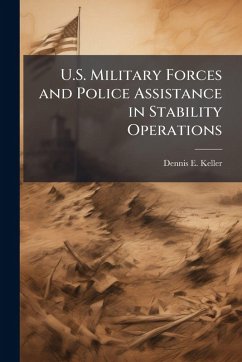
Impediments to the Creation of a Specialized Force for Stability Operations
Versandkostenfrei!
Versandfertig in über 4 Wochen
14,99 €
inkl. MwSt.

PAYBACK Punkte
7 °P sammeln!
This study is an assessment of the Department of Defense's response to the call to create specialized forces to address the exigent strategic requirement for stability and reconstruction operations in Afghanistan and Iraq. To make an assessment it was necessary first to understand the reason for the call by analyzing the different proposals and the analogy made with the Vietnam-era CORDS program. That analysis revealed that the passage of time has sanitized the memory of CORDS from the political considerations that facilitated its creation. Today, there are significantly more political issues ...
This study is an assessment of the Department of Defense's response to the call to create specialized forces to address the exigent strategic requirement for stability and reconstruction operations in Afghanistan and Iraq. To make an assessment it was necessary first to understand the reason for the call by analyzing the different proposals and the analogy made with the Vietnam-era CORDS program. That analysis revealed that the passage of time has sanitized the memory of CORDS from the political considerations that facilitated its creation. Today, there are significantly more political issues to address before implementing a force development program. The analysis exposed DOD's response to the call for new organizations. The DOD response did not directly prevent creating specialized units for stability operations, but it did delay the serious consideration of those proposals. How DOD embraced the need for stability and reconstruction operations while fending off the creation of specialized units is a story that reveals in bold relief the salient features of congressional defense and budgetary politics. The study found that advocates for a specialized force fail to realize that strategic requirements are only one of the important factors that the Department of Defense must weigh before undertaking resource intensive initiatives. As an agency of the US government, the Department of Defense must navigate a course that addresses the political environment as well as operational requirements. In today's political environment, the DOD must consider the partisan political relationship between the executive and legislative branches along with the impact that a new initiative will have upon the implementation of ongoing programs. The Department must also identify the consequences associated with creating additional resource demands and the effect of the new demands on the budget distribution between existing programs, agencies, and current operations. By considering these in This work has been selected by scholars as being culturally important, and is part of the knowledge base of civilization as we know it. This work was reproduced from the original artifact, and remains as true to the original work as possible. Therefore, you will see the original copyright references, library stamps (as most of these works have been housed in our most important libraries around the world), and other notations in the work. This work is in the public domain in the United States of America, and possibly other nations. Within the United States, you may freely copy and distribute this work, as no entity (individual or corporate) has a copyright on the body of the work. As a reproduction of a historical artifact, this work may contain missing or blurred pages, poor pictures, errant marks, etc. Scholars believe, and we concur, that this work is important enough to be preserved, reproduced, and made generally available to the public. We appreciate your support of the preservation process, and thank you for being an important part of keeping this knowledge alive and relevant.












